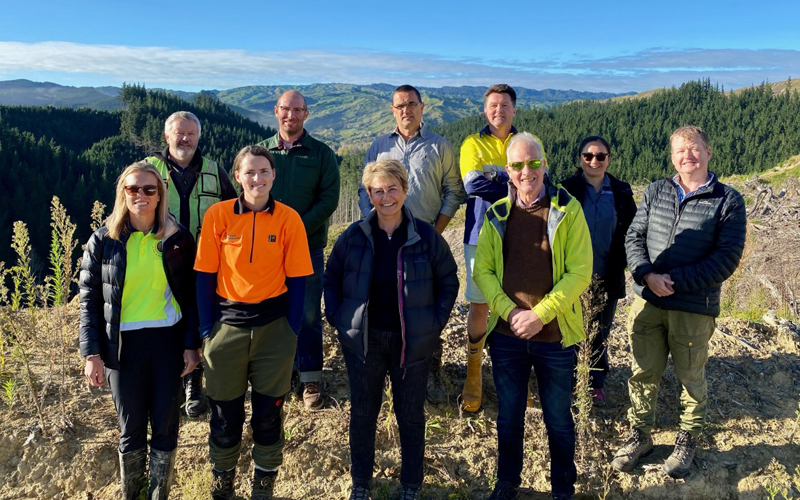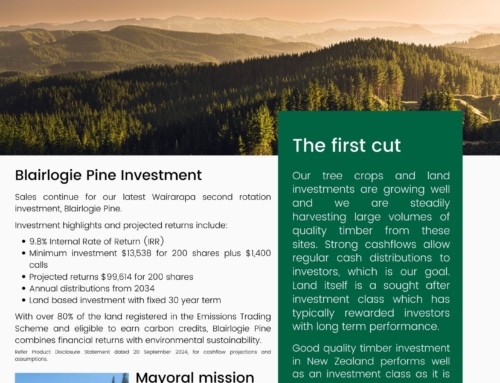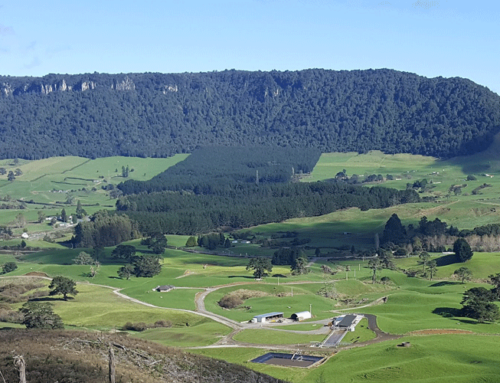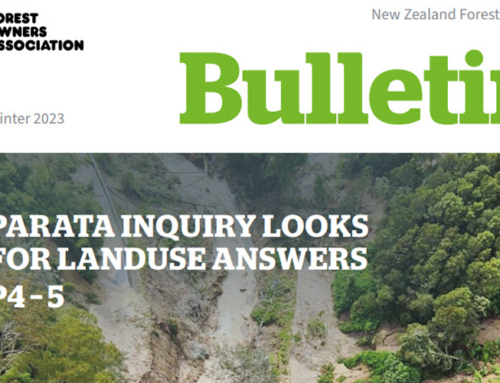Eastland Wood Council
(31 March) In the Emerald Hills Forest near Gisborne today, Forest Enterprises’ Gisborne Regional Manager and co-owner Dan Fraser and Harvest Forester Georgia Paulson hosted the Eastland Wood Council (EWC) and the Ministerial Inquiry into Land Use (MILU) panel charged with reviewing land-use practises in Tairāwhiti.
Panel members were invited to travel through forests to see some of the impacts of recent cyclones. They were shown new catchment management practices Dan Fraser put in action in 2018, as well as mitigations Forest Enterprises’ contractors have adopted to move away from conventional skyline cable logging and ground base logging systems to improve the health & safety of workers and deliver improved environmental outcomes and efficiency. Dan Fraser led the development of the EWC’s Good Practice Guideline for Catchment Management.
The review into past and current land-use practices and the impact of woody debris, including forestry slash and sediment, was announced by the Government, and is widely supported by the forestry sector, with EWC offering local solutions to local woody debris concerns in Tairāwhiti following recent catastrophic weather.
EWC CEO Philip Hope says this latest engagement with the panel was important as it allowed members to have discussions with the panel, and to show the extremely difficult terrain and soils that all land users are faced with in Tairāwhiti.
“We had a really fulsome conversation with the panel, and we thank them for taking the time to engage with us. EWC members were able to show some of the tangible steps that they have taken to implement wholesale changes to forestry practices since the last significant storms, and the impact that these changes have had on limiting debris movement in these most recent weather events.
“At the same time, we were able to show the panel the vulnerable landscapes we have on the coast and some of the mitigations that have already been put into place, such as managing clearcuts, how we manage harvest residues on landslide prone slopes, and steps to leave mature trees to act as natural debris traps. The highly erodible soils of the East Coast is an issue faced by all land users, and EWC members are committed to improving the resilience of the forestry industry in Tairāwhiti.
“This year’s really devastating weather has shown us that we do need to adapt more of our forestry practises and make further changes to the way that we run and manage our production forests, so we are both supporting good environmental outcomes for our community, while continuing to support the jobs and livelihoods of many hundreds of families in our region,” Mr Hope said.
Improving forestry’s resilience in Tairāwhiti means ensuring that forestry practises behind the gate are working well and helping to shore up the highly erodible soil in the region. Some examples already put forward by EWC members to the panel, include constructing slash traps, slash grapples, planting new land or replating previously afforested land, and the development and implementation of EWC’s Good Practice Guideline for Catchment Management.
“We are committed to thinking outside the box and finding solutions to the woody debris issues. We support local solutions to this local problem, and we are stepping up as a sector to make sure we are part of the solution. “At the same time, the clean-up continues, and a number of forestry companies across our region are working hand-in-hand with the community as we recover from the devastating storms.”
Pictured: Front row L-R: Nicki Davies, Georgia Paulson, Hekia Parata and Dave Brash.
Back row L-R: Matt McCloy, Pat Bethel, Dan Fraser, Andrew Knudsen, Sarah Pohatu, Jason Blair
RELATED:
Forester has plan to sort steep slopes for the next gen
Forest Enterprises forests stand up to New Year storms
Investment forests in good shape after East Coast weather bombs








